

Building a Better Region


Mid-West Policy Priorities for Election Cycles 2024


of Contents Housing Local Government Priorities 2024 European Parliament Priorities 2024 Directly Elected Mayor Priorities 2024 Skills & Talent Limerick City Centre Energy Security Infrastructure Transport & Connectivity Pg 7 Pg 9 Pg 11 Pg 13 Pg 15 Pg 17 Business Viability Pg19 Key Asks Pg 3 Pg 5 DEM Role
Table
Foreword
In anticipation of the forthcoming elections, it is of critical importance, that Limerick Chamber, the largest business organisation in the Mid-West, articulates a robust and forward-thinking agenda. An agenda that has been formulated through our evidence-based approach to policy making. Policy making that addresses the complex challenges facing our society both from an individual, household and business perspective. This document serves as a blueprint for our collective aspirations, outlining key policy priorities essential for fostering growth, fairness and sustainable development.
Central to our vision are the critical pillars of housing, skills, and talent cultivation, which form the bedrock of social mobility and economic prosperity. In parallel, we recognise the imperative of fostering vibrant and resilient urban environments that accommodate our burgeoning populations while preserving our cultural heritage.
Furthermore, in an era characterised by rapid globalisation and environmental concerns, ensuring energy security and enhancing both domestic and international transport and infrastructure are paramount. These efforts not only facilitate economic exchange but also promote social cohesion and environmental stewardship.
Equally significant is the imperative of reducing barriers to business entry and operation. By streamlining regulations and fostering an environment conducive to entrepreneurship, we endeavor to unleash the full potential of our economy and create opportunities for all.

Throughout this document we have provided direct links to our evidence-based research to support our policy positions. While this list is not exhaustive, it will provide candidates with background knowledge of the Chamber's research.
While we acknowledge powers are limited for various levels of office, we feel that all elected candidates have the power to lobby for a better city, county and region, and hope that our research and recommendations within this document will help those candidates to more effectively lobby for the region. To make it easier for candidates to see where we think they can exert their influence, we have outlined which level of the upcoming elections are targeted by each recommendation with the legend as follows.

= Directly Elected Mayor for Limerick
= Councillors
= European Parliament
Noel Gavin President, Limerick Chamber

Housing Infrastr
• Greater emphasis on affordable purchase & rental
• Quicker activation and accountability on state-owned land
• Landbanking
• Utilise older buildings
•Ensuring adequate tenure mix with purchase and affordable rental options
City Centre
• Implement recommendations of Limerick City Centre report
• Review commercial rate write offs for vacant properties
• Deliver a holistic city centre transport and delivery plan
• Advocate for increased police presence
• Ensure greater key projects
• Ensure adequat residential prope to key infrastruct
• Ensure delivery and transport pro

ructure Transport Business Viability
accountability of
te zoning for erty in proximity ture
y of critical road ojects
• Continue to advance and support public and active transport options to areas of high employment, particularly Annacotty Business Park
• Advance the city centre transport and delivery plan
• Increase density of development by adhering to the principles of Transport Oriented Development
• Ensure minimal business disruption with projects
• Ensure that projects and policies being brought forward complement other pieces of work
• Ensure greater footfall by ensuring housing and transport options are in place

DELIVERING A BETTER REGION
Limerick Chamber

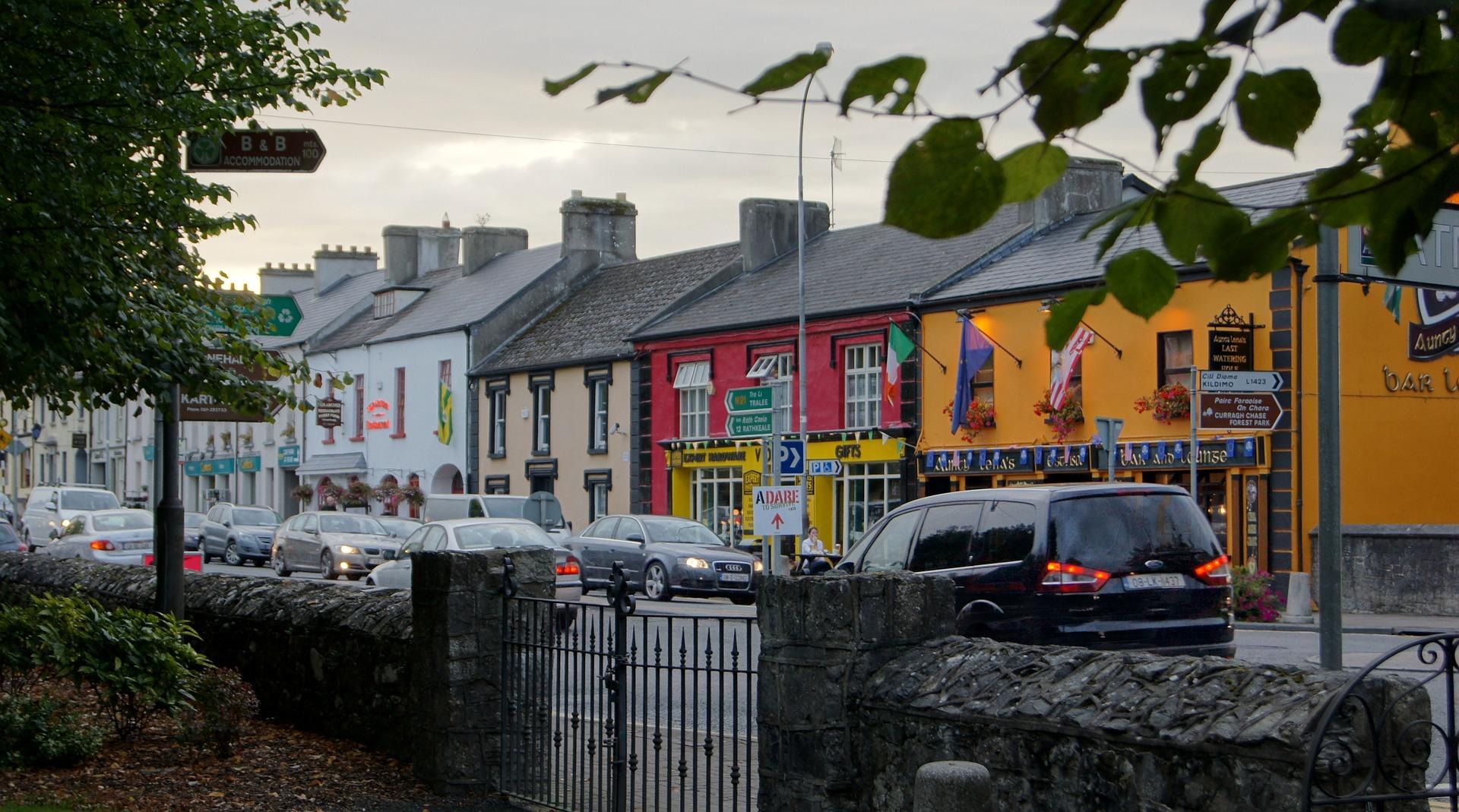
The importance of upcoming elections
IRELAND'S FIRST DIRECTLY ELECTED MAYOR & THE IMPORTANCE OF THE ROLE
In 2019, the Mayoral plebiscite was undertaken, which saw the citizens of Limerick vote for an executive mayor with real power. Following that, the Chamber also saw our former CEO sit on the Implementation Advisory Group which was established in 2019. Fast forward to 2022 and as the legislation began working its way through the Houses of the Oireachtas, Limerick Chamber increasingly advocated for the new Directly Elected Mayor to be a fully fledged executive mayor. While these full powers did not come to pass, the role still has a significant mandate and power, upon which the right person can truly change the whole county of Limerick for the better.
The importance of the new mayoral role cannot be understated. The responsibilities of the new mayor go beyond ceremonial mayors of the past. That is why it is of critical importance for all Limerick stakeholders, Limerick Chamber included, to inform people of the importance of the role and the importance of researching candidates, and of course voting. There is the potential that this new mayoral role might be seen as 'more of the same', however, if people truly want change, the Chamber believes that the right mayor can deliver this change. However, for the right mayor to be elected, we must spread the word far and wide regarding the importance of the election.
As important as the role is from a political standpoint., the position of mayor is not solely political in nature. In many ways they will be heavily influential in a long standing organisation, Limerick City and County Council, that employees over 1,500 people. That is why we believe the right candidate will likely need appropriate experience; namely leading a large organisation and proven ability on delivering strategic change. But they must also be able to work with others, such as the executive and staff of Limerick City and County Council and also elected councillors, to ensure items are delivered on.
Furthermore, the new Mayor will have the responsibility of preparing the annual local authority budget. The adopted budget for 2024 indicated a current (day-to-day) expenditure of €249 million, meanwhile the allocated capital budget for 2024 is €460 million, for 2025 it is €471 million and for 2026 it is €386 million. Totalling €1.3 billion from 2024 to 2026. It is important to note, to avoid any confusion as to what revenue is available to the mayor, that Limerick City and County Council is home to the Housing Assistance Payment (HAP) Services Centre, which saw a allocation of €694 million for 2024. This is responsible for the administration of HAP country wide, and will not be a line item that will be in the mayor's available budget for expenditure. However, a budget of over €700 million per year, in capital and current spending, is still a significant amount, and the Chamber believes that the right candidate should likely have budgeting experience as part of leading an organisation to ensure that funds are appropriately and efficiently managed during the budgeting process.
While the operational aspects of the role, listed above, are incredibly important so too are the deliverables aspect of any politicians career. It is important to understand what the mayor will have responsibility for and what they will not have responsibility for.
The actual responsibilities of the mayor, as outlined by the Department of Local Government, involves taking on executive functions at a strategic policy area with the following:

1) Strategic development, that is, proposing the development plan for the City and County and driving the economic and spatial development of Limerick
2) Housing and building, for example, developing a housing strategy for Limerick and ensuring its delivery
3) Road transport and safety, that is, road maintenance and improvement, and traffic management
4) Environmental services, that is, the services that help to protect and enhance the environment in Limerick

Comparatively, the current Chief Executive of Limerick City and County Council will become the Director General, and will have operational responsibility for the running of the Council. A range of executive functions will also remain the responsibility of Director General, including: managing and accounting for the council’s finances, HR and local authority staffing matters, administration of individual schemes, allocation of individual grants, legal proceedings and enforcement matters relating to individual schemes or grants.
Elected councillors reserved functions will not change and they include adopting the Council’s annual budget (by way of vote), adopting Council policies, altering the Local Property Tax rate, making a City and County Development Plan, deciding the annual rate on valuation for Commercial Rates, selling or disposing of Council land, approval of grant schemes and adoption of a Corporate Plan and a Service Delivery Plan.
However, despite the mayor not having powers in some areas, we think one of the unique selling points of a mayor representing the whole county is their ability to lobby , influence and advocate on behalf of the whole county of Limerick. That means highlighting issues, holding decision makers to account and advocating for change. We do not need a silent mayor, in fact, we need the opposite. We need somebody that is keenly aware of the issues and is willing to fight for Limerick on these issues at the county, regional and national level. Therefore it is likely that the best person for the job will have existing experience in this area.
Another aspect that the right candidate will likely need is an understanding of policy, from a local, regional, national and even European level. Policy, for the most part, will define the parameters upon which a mayor can deliver, and to fully hit the ground running, the right candidate will likely need significant policy experience; from housing, to transport, to energy, to climate, to business etc., if not, there will be a very steep learning curve for the incoming mayor.
Another aspect that will benefit any incoming mayor is experience in a political environment, be that experience as an elected official or somebody that operated in some capacity in meeting and lobbying officials. This experience will serve candidates as they will be going into the role fully briefed on the subtleties and rules of a political environment.
While the process for a Directly Elected Mayor is a political process whereby the candidate will be elected based on their programme, in many ways it should be treated like a regular job interview. Let's not forget that it is an executive position after all. Candidates should not solely be examined on what they can do for Limerick in the future if elected, but also on what they have done in the past i.e. their past career history, lived experience and probably most important of all, their experience in delivery. We should all go into this election with "fresh eyes", looking at candidates holistically rather than based solely on promises of delivery in the future.
Limerick needs a mayor that is realistic, a mayor whose programme is based in reality, and acknowledges areas where they have responsibility of delivery and areas where they do not but can still lobby. An example here is the local hospital system, which has featured in candidate interviews so far. While the Mayor will not be responsible for the hospital, they can certainly advocate for a better health system. The mayor needs a real programme for delivery and not a programme based on "issues of the day" whereby they will have no responsibility for delivery.
Next comes the mayor's direct budget, a budget reserved solely for the office of the mayor. This budget is outside the local authority budget mentioned above, and can be used exclusively for the delivery of mayor's projects. The annual budget is expected to be c. €8 million per year, which will be pro rated for 2024. While not exactly the budget people wanted for the role, it can yield very positive results if used effectively. Of course, there is always scope for the mayor to ask for more money from central government to deliver certain projects, and there is always the possibility that the mayor could work with the Local Authority to raise external finance.
For example, if a candidate is running on a campaign of "town revival" they can use the budget to introduce a number of schemes aimed at improving the aesthetics of a town, village or city. If a candidate is running on a housing first platform, they can use that money to either develop a state owned site by brining it through the planning process etc. or indeed they could identify a strategic site and purchase that for the provision of housing. The important aspect here, from a voters perspective, is to understand from all candidates how they expect to allocate their own budget. This is one of the most solid ways to identify what the mayor will actually deliver on.
However, there are other items the mayor can deliver on that will not cost money, or indeed very little. Such as increasing transparency which could look at live streaming council meetings, publishing minutes of their meetings, publishing their diary etc. There is also scope to publish research, working papers, draft projects and indeed capital project timelines. Undertaking a transparency programme such as this will break down walls that exist between decision makers and citizens, and indeed highlight work that is being completed in the background. There is also potential for the mayor to run scheduled town halls whereby citizens can attend to ask questions or for updates on certain projects.
A directly elected mayor for Limerick can help to deliver a better region by engendering greater collaboration across county lines with others in the Mid-West. There are more things that unite us in the Mid-West than divide us. We share an education, health and transport system, we are consolidated in terms of employment nodes, and many of us travel through at least two of the three counties of the Mid-West on a daily basis.

Delivering A Better Region
That being said, there is still a disappointing lack of clarity for the public around some functions and ultimately who will be responsible for delivering them i.e. will it be the mayor or director general. There are also outstanding questions on how the organisational structure and reporting lines might or could change within the local authority. Good candidates will be able to answer these questions as part of their campaign.
Combined with this, the first mayor is in for a whirlwind first few months with a new council being elected, the budgeting process and of course delivering their official programme for mayor (which you would hope many candidates have completed as part of their campaign prior to taking up the role) all while finding their feet and establishing a new office with new staff within the local authority.
Of course, there are many other traits that a mayor will have to bring to the table; honesty, integrity, passion, humility, vision, collaboration and common sense to name a few. There is no end to the words or traits that could be applied to the person that will be the best fit for the role.
There is scope for the office to be reviewed after three years, where the mayor can provide feedback to Government officials. This means that we need a mayor that is not only open to change, but that advocates for it when it is required.
While many people voted "no" to a Directly Elected Mayor in 2019, and many people that voted "yes" being unhappy with how the office turned out, it is now the structure that we have. It is up to all of us, that want a better Limerick and region to ensure that the office and the mayor is a success. With the right candidate, there is huge scope for change.
All of us Limerick stakeholders also need to be realistic about the mayor's powers too. The office of the mayor will not be able to rectify all grievances, or challenges that Limerick faces. They will have a targeted brief, and when we are analysing campaigns and indeed going to the voting booths on June 7th, we need to remember this. However, they will still be able to challenge the system and advocate for a better Limerick and indeed a better region, in fact, this should not be limited to the mayor and we would encourage all elected representatives to be more vocal on the issues we see.
To finish, we must highlight, that the Chamber is an apolitical organisation with no affiliation to parties or candidates and provide no endorsement for the same. And, as we have done in the past, we will work across all political, party and non-party, lines to ensure that Limerick, and indeed the Mid-West, delivers for both the people and businesses that reside within.
Seán Golden Chief Economist & Director of Policy Limerick Chamber


Over the last several years housing has emerged as the top priority and issue for the majority of our businesses. Therefore, Limerick Chamber allocates significant research in this area so we can use an evidence-based advocacy approach for increasing home provision for workers across the Mid-West.
The present housing scenario poses a significant threat to businesses, extending beyond the Mid-West to encompass the entirety of Ireland. Affordable and market housing serves as a crucial element in supporting both employees and businesses by offering stability and fostering economic growth. However, delivering adequate housing faces considerable challenges in Ireland, marked by a severe shortage of all housing options.
While the state bears the responsibility of allocating funds for housing delivery, it is equally accountable for ensuring transparency and responsibility among the departments, agencies and other Government funded organisations tasked with implementation. Election candidates should prioritise emphasising this accountability. Limerick Chamber's work primarily addresses the concerns of owner-occupiers and renters, who experience heightened pressure in the current market.
There is unlikely much European "influence" that could help solve the housing issues in Ireland, unless funds are allocated at a European level to countries. However, funding, at least at the national level, has not proven to be a challenge for state housing delivery. Therefore, the emphasis on housing is for local election candidates and the Directly Elected Mayor.


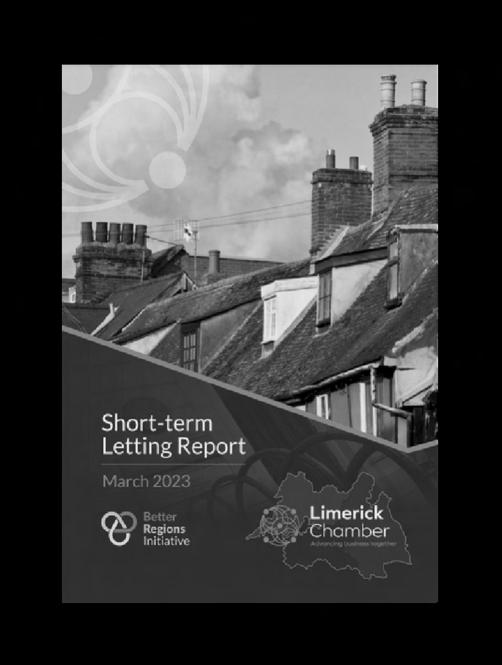

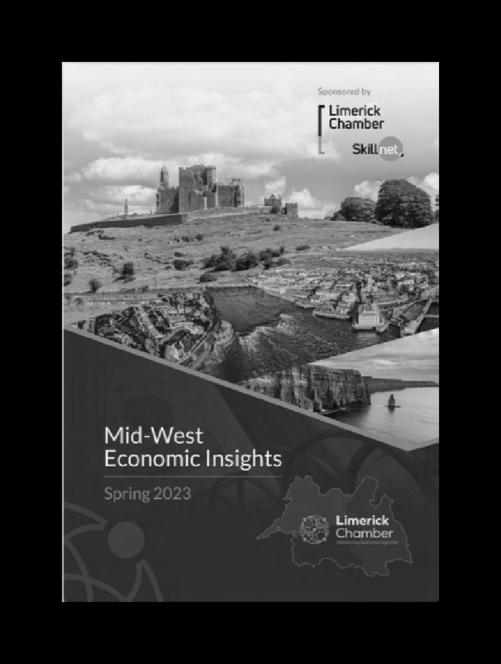
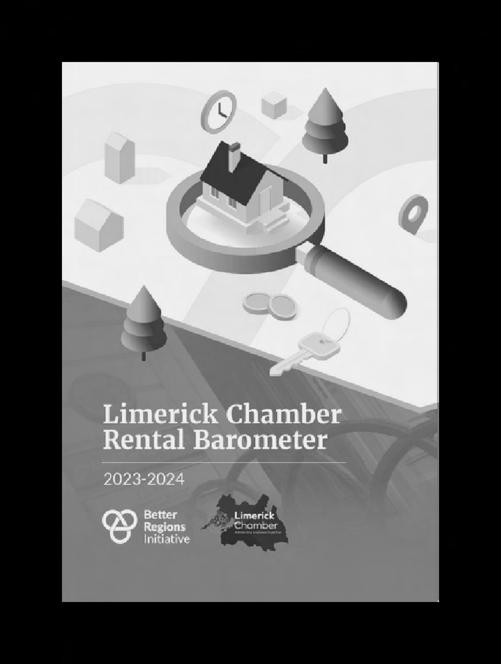
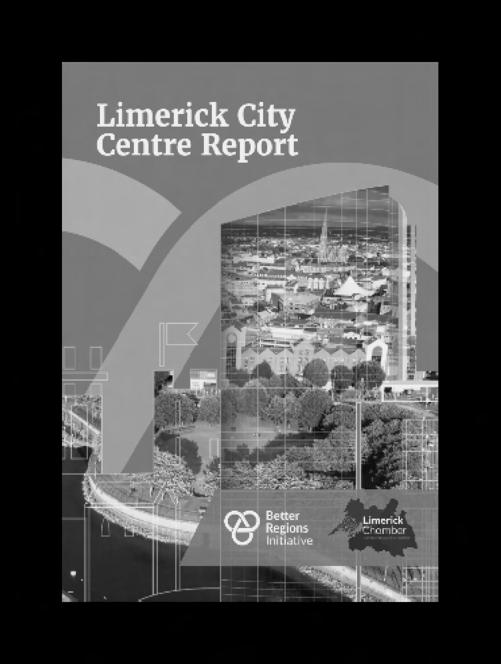
Short-term letting Report
Budget 2024 Submission
Mid-West Economic Insights
Limerick Rental Barometer
Limerick City Centre Report
Click the documents to read the full research papers
Page 7
Housing Supporting Research
Key Asks:



• In the last number of years, bulk buying by state organisations, or those funded partially by the state, has become more common. Just 4 out of every 10 new homes went to owner occupiers in 2023. This puts further pressure on those attempting to purchase homes in the market by reducing the supply of available homes on the market. It is imperative that bulk purchasing cannot go ahead without a significant portion of the site being allocated to cost rental, affordable purchase and market purchase. Development Plans must be updated to ensure that home ownership is enshrined in sites delivered by the state, local authorities and approved housing bodies.

• Land banking is becoming an issue for those within the state apparatus. It is of critical importance that those tasked with delivering social and affordable homes have a sufficient strategy to build up their land reserves for the direct delivery of homes.
• There must be a drive for more accurate and realistic housing targets at a local level. Existing targets underestimate total demand in the system by not accounting for pent up demand. As part of this, organisations must be provided with affordable housing (rental and purchase) delivery targets at a local and regional level i.e. approved housing bodies (AHBs) and the Land Development Agency (LDA).


• There is scope within the Mid-West to have an indigenous approved housing body set up that focuses exclusively on affordable housing. There would be added value for this Affordable Approved Housing Body (AAHB) to focus on delivery of homes on smaller state lands, as well as working with developers to direct renovated Georgian properties to renters and owneroccupiers. There is also scope to examine the use of existing DACs within Local Authority ownership.
• The maximum amount eligible to be borrowed under the First Home Scheme and the Local Authority Home Loan, must be increased, not only to match other cities but to also reflect the new home market across Limerick and the wider Mid-West.

• Tweaks and amendments are required to the living cities initiative to make it work better for Limerick. Elected representatives need to advocate for these changes, along with Limerick Chamber. An in-depth analysis of what is required is part of the Limerick Chamber Budget 2024 Submission.

• The glacial pace at which some critical state lands are being brought forward needs to change quickly and drastically. Elected representatives need to hold organisations to account and ensure timely and efficient delivery.

• Local Authority schemes should be expanded to focus more on cost rental and ownership. For example, the Repair and Leasing Scheme should be expanded to include cost rental homes. Meanwhile, the rightsizing scheme could be expanded to include cost rental and ownership opportunities for workers.

• Student accommodation is often forgotten about. Students are the lifeblood of the future of the economy in the Mid-West and elected representatives need to focus on including student housing in the affordable housing conversation.

• The State and its wider apparatus must move away from purchasing homes to focus more on the direct delivery of homes on sites. This will ensure additionality to the housing sector. Similarly for the likes of the Housing Assistance Payment (HAP), the State must move away from reliance on the private rental market for what would be social housing.

• Where the state provides direct non-repayable funding for the delivery of social housing by organisations, the state should take an equity stake in these homes.
Page 8
Skills & Talent Supporting Research
In the dynamic landscape of Ireland's business environment, the imperative to support individuals, enhance skills, and cultivate talent has never been more crucial. As a small, open economy, Ireland relies heavily on its human capital to drive innovation, competitiveness, and economic growth. Investing in people not only fosters individual success but also fortifies the foundation of a robust business ecosystem. In fact, from our member feedback, Ireland's human capital is one of the primary reasons businesses decide to locate and indeed set up here.
Skill development is key to navigating the evolving demands of industries in Ireland. With technological advancements and global market shifts, businesses must continuously adapt. By supporting employees in upskilling and reskilling initiatives, companies can ensure a workforce that remains agile and adept in emerging fields, contributing to the overall resilience of the Irish economy. To date, great work has been implemented through Skillnet and also the Springboard programme. However, we must not become complacent.
Moreover, talent attraction and retention are pivotal for sustained business success. Ireland's reputation as a hub for innovation and technology necessitates a skilled workforce. However, attracting and retaining talent goes far beyond businesses remit and is often influenced by housing, childcare etc.
The symbiotic relationship between business success and human development is undeniable. Supporting people, improving skills, and increasing talent not only propels individual careers but also fortifies Ireland's position in the global business arena, ensuring longterm prosperity and sustainability.



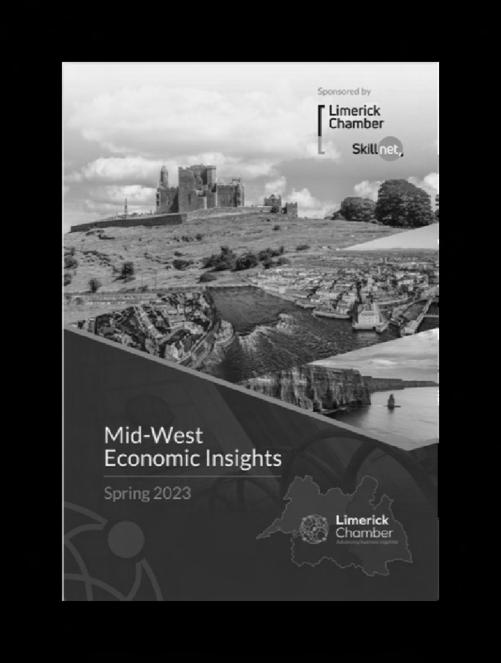
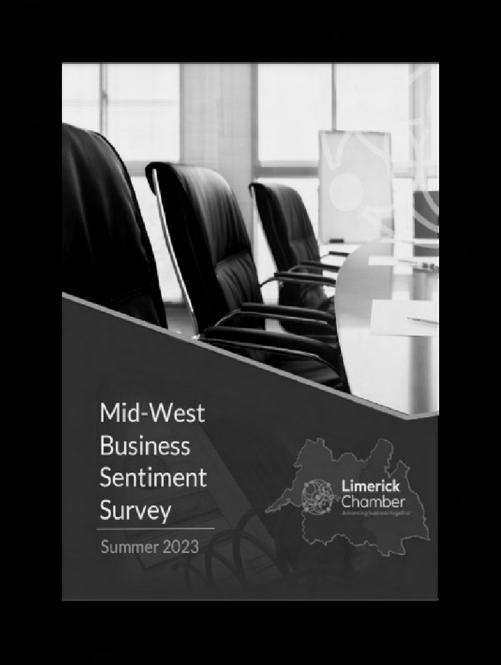
Budget 2024 Submission
Mid-West Economic Insights
Mid-West Business Sentiment Survey
Page 9
Click the documents to read the full research papers
Key Asks:


• An appropriate regional skills demand assessment should be undertaken and published at the regional level which should identify current and future skills deficits by undertaking consultation with employers. This overview should feed into providing updated training and education options for these skills by educational institutions across the region. From a regional perspective, it is important to understand the skill demand in key growth areas such as floating offshore wind, so we can adequately prepare for the future as well as dealing with the present.

• Candidates should work to increase sectoral participation for critical sectors, which may bolster workforce numbers. For example, there are reported shortages in the education and health sectors where the male population only make up 26% and 20% of the roles respectively. The state needs to encourage more males into these roles. On the other hand, 92% of the construction workforce is male, and more females should be encouraged to work in this sector.

• Security and policing has always been cause for concern for businesses, particularly those working in retail. In the last number of years it appears to have become more of a concern for wider society. This means workforce planning for police has become even more important. Currently, the system sees police allocated based on crime level. However, if crime is under reported then that means a location will miss out on increasing policing numbers. Limerick Chamber would like to see police force numbers aligned with population growth for cities with allocated visible policing for city centres. As part of this, there is scope to work towards reallocating police from the court house on Mulgrave Street, to on the beat visible policing.


• The Irish Residence Permit (IRP) system can become much more efficient. Together, we can lobby for an improved system. Currently, there is a two tier system. In Dublin, a person can go through the process of obtaining their IRP online. Meanwhile, outside Dublin a person must visit their local police station, which causes strain on Garda numbers and increases the likelihood of a backlog. This is particularly important for people undertaking English language courses as they can work 20 hours a week, but due to current waiting times it is almost impossible.
• The Australian critical skills list and website should act as a template for Ireland to expand its presence online. The Australian system provides a user friendly portal whereby potential skilled immigrants can view jobs within regions and also which visa is suitable for the vacant role. All candidates must work towards making the system easier to attract key skills and workers.

• Outside policing, Limerick Chamber are keenly aware of the critical role other public servants play in society. Particularly those working in the education and healthcare sector. As a county, region and society we must all lobby together to ensure that Limerick and the wider Mid-West is appropriately staffed to deal with population demands. Of course, supporting infrastructure for these jobs is also required such as improved housing, childcare and transport options.

• Given the significant spend by the state into education, upskilling and reskilling programmes, there needs to be assurances that this spend is resulting in the required outcome with people being trained to the level required under the programme. This also needs to be tied into future industry skills needs to ensure that people are trained to the level required by industry.
Page 10
Limerick City Centre Supporting Research
Limerick City Centre stands as the pulsating core of the Mid-West region, embodying a rich history of commerce, culture, and community. As the city undergoes transformation and expansion, the imperative lies in ensuring the resilience and adaptability of the city centre meet the evolving needs of residents, businesses, and visitors. The Limerick Chamber City Centre report is the most comprehensive report ever produced and published, which targets the core city centre area. This comprehensive report delves into pivotal aspects shaping the future of Limerick City Centre, meticulously scrutinising its current status, discerning challenges and opportunities, and providing strategic recommendations. The objective is to lay a robust foundation for a city centre that not only prospers but sustains its dynamic essence for generations to come. We would encourage all candidates for Mayor to adopt all, or some, of the recommendations of the report into their programme.
Structured into three sections, the report begins by analysing Census 2022 data specific to the city centre, followed by insights gleaned from a dedicated survey. These findings then culminate in evidence-based recommendations aimed at enhancing the city centre.
In essence, the City Centre Report is a blueprint for advocacy, lobbying, and future development, aligning with the broader ambitions of Limerick Chamber. As Limerick gears up for transformative changes, including the Directly Elected Mayor and the Ryder Cup, the report becomes an indispensable tool for steering the city toward new heights of success.



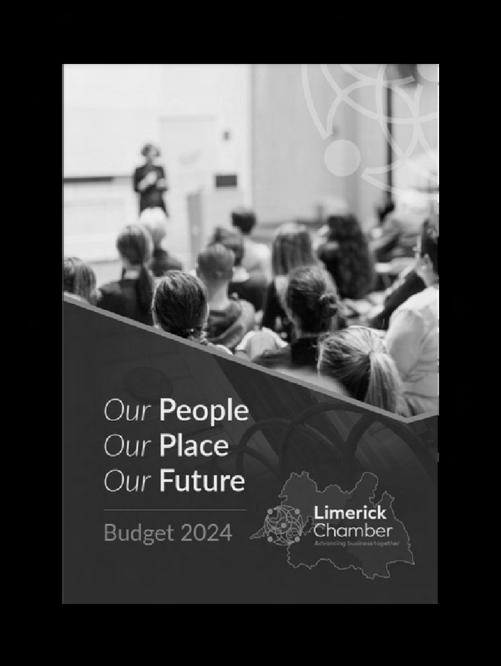
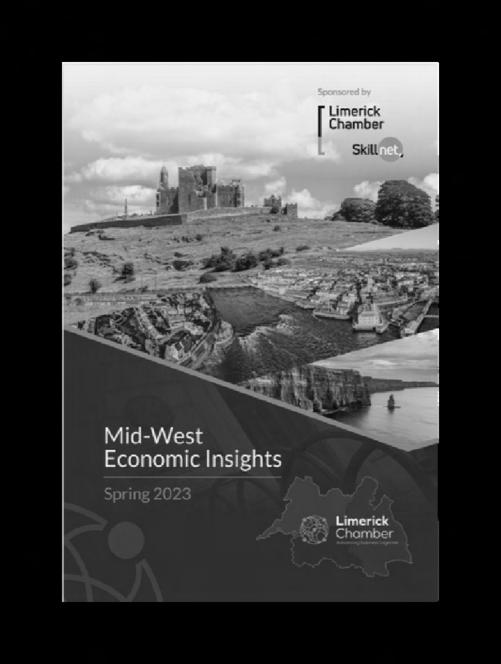
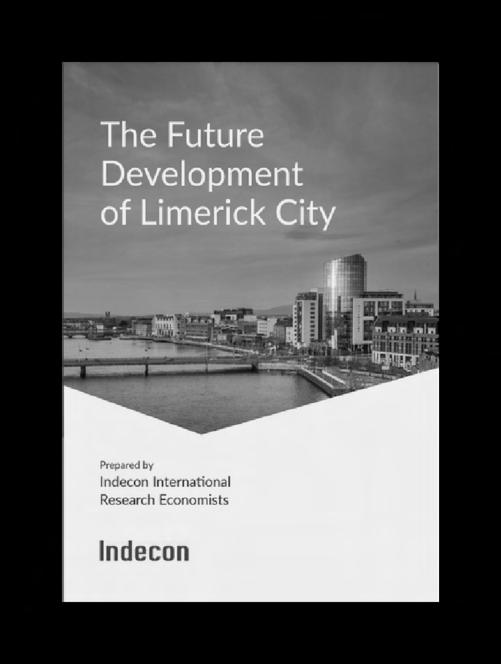
Limerick City Centre Report
Budget 2024 Submission
Mid-West Economic Insights
Future Limerick Report Click
Page 11
to read the
the documents
full research papers
Key Asks:


• There needs to be an increased awareness of the importance of crime reporting. Reporting figures has a direct relation to the number of Gardaí allocated to a region, We ask that elected representatives champion this cause.

• There are a number of measures that should be introduced to lift up the vibe and aesthetics of towns and urban centres;
• Introduce a ‘Painting Grant Scheme’
• Introduce a project to tidy external wires on heritage buildings and core streets
• Introduce commercial building signage regulations to ensure uniformity of style/quality of city centre signage.
• Introduce ‘Signage improvement grant’
• Introduce ‘Shop Front Improvement Scheme’ for existing businesses.
• Develop guidelines for the presentation of vacant commercial premises.
•Bring forward a ‘Meanwhile’ use strategy for vacant / derelict sites and buildings.
• Introduce bin storage units for commercial and residential buildings on key streets and laneways in the city centre.
• Expedite the decluttering of signage in the city.

• Both councillors and the Directly Elected Mayor, as part of the annual budget process, should allocate adequate funding for street cleaning in the city centre to ensure greater cleanliness than is currently seen in the city centre.

• The existing bike bunker scheme should be expanded for the general public to have access as well as increase the provision of bunkers.

• Review work done to date on the laneways project and bring forward any revisions necessary in light of the evolving policy context. Progress on this project has been poor, despite is huge potential.

• A funding programme should be developed to facilitate joint applications by building owners and artists for proposed artworks, which can respond to set themes or be site-specific. We understand there are existing schemes that cover general arts and also vacant and derelict buildings, but our recommendation is focused towards all buildings to increase attractiveness of the city centre.




• There is merit in developing a vacant homes portal or database where prospective buyers can see homes that are already vacant. This would remove the uncertainty of a potential home being vacant or not for the vacant homes grant which is often difficult to discern for a prospective home owner.
• Review current guidelines regarding commercial rate write-offs for vacant properties in the city centre. Adopt a carrot / stick approach to support occupancy
• City centre-specific tenure mix policy should be introduced with higher Affordable Housing and private ownership targets in order to address the current imbalance in city centre tenure.
• Location of social services in the city centre should not be overly concentrated in one area and should be spread around to dilute any negative impacts on the working / living / investment environment.





• Both councillors and the Directly Elected Mayor, as part of the annual budget process, should examine the potential to increase the number of traffic wardens to better enforce illegal parking.
• An audit should be carried out of safe crossing points in the city centre to identify gaps where crossing points should be introduced.
• Review current sites of public toilets and identify suitable locations for additional facilities.
• Expand the existing footprint of Arthurs Quay Park to increase green spaces and bio-diversity in the city centre.
• A task force with budgetary support to be established to develop plans for the revitalisation of Cruises Street and other challenging areas. These groups must publish key performance indicators and progress.

• The current transport, delivery and mobility strategy underway with the National Transport Authority is critical and must introduce a plan for travelling around the city given the numerous travel projects underway. Ultimately, we must ensure there is minimal disruption to business.
Security
The pressing reality for Ireland's energy security hinges on two potential paths: either maintaining the status quo and depending on the United Kingdom's gas pipeline at Moffat in Scotland, or recognising the imperative for substantial efforts to unlock the full potential of Offshore Renewable Energy (ORE) in Ireland as well as expanding the security of gas supply. In the past, Limerick Chamber has advocated for, and will continue to advocate for the latter option, sending a clear signal to the industry that Ireland is genuinely committed to ORE. One of the most critical items of importance is bringing forward the Designated Maritime Area Plan (DMAPS) for the west coast. This brings clarity and security to private investors that will be moving these projects forward.
However, recognising the extended lead time for ORE projects, aligning with European Union energy policies ,and supporting Liquefied Natural Gas (LNG) in Ireland during the interim period is a prudent move from a security standpoint. Limerick Chamber has advocated for LNG introduction from a security of supply point of view.
However, the future of energy security should not be isolated to ORE but also needs to focus on energy generation on land with on land windfarms, as well as the use of biomass and alternative fuels.
Unlike other sections in this document, European MEPs have a significant part to play in the future of energy security in Ireland.



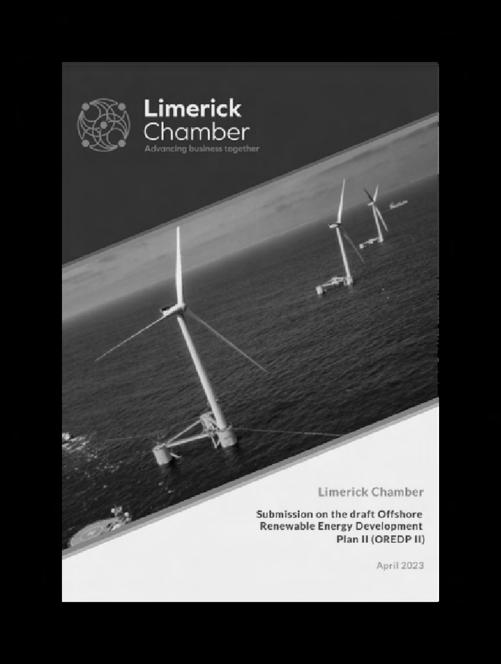


Offshore Wind
Phase 2 Consultation
National Energy Security Framework Consultation
Security of Energy Supply Consultation
Offshore Renewable Energy Development Plan II Consultation

Review of National Ports Policy Consultation
Click the documents to read the full research papers
Page 13
Energy
Supporting Research
Key Asks:



• Port infrastructure is critical to develop Ireland’s energy security, through offshore renewable energy and other forms of energy. Therefore port upgrading and expansion should be prioritised
• As outlined in Limerick Chamber’s submission to the Review of the Security of Energy Supply of Ireland’s Electricity and Natural Gas Systems, Ireland needs to adopt a proactive approach to the implementation of LNG. Not only will utilising LNG align us with European Policy, but it will secure Ireland’s energy while we implement the necessary changes to take full advantage of renewable energy.

• The length of time required to obtain an investigative foreshore license is not appropriate, and in some cases takes a number of years. This is risky for attracting private investment and must be addressed.

• We need to ensure that future plans for Limerick align together. For example, Foynes is set to become a renewable energy hub, therefore we need to ensure adequate land is zoned for residential accommodation. We also need to ensure that Foynes is well connected to public transport links via rail and road. We also need to ensure the road network upgrade to Foynes is delivered by 2030, which is of severe importance to TEN-T designation.

• There needs to be increased co-ordination and strategic support at the local level for the development of skills, supply chain and supporting infrastructure for ORE. Critically, supporting infrastructure supports must include harbours, operations and maintenance.


• Local Development Plans (LDPs) must align with national policy, including the climate action plan and other renewable development policies.
• Local authorities need to be supported more, and encouraged to implement specialist planning teams to deal with renewable energy development assessments. This is of critical importance, as the industry expands and innovates it will require planners with completely new skills and mindsets.


• MEPs must push for the implementation of the revised Renewable Energy Directive (RED III) amongst member states.
• At both a national and EU level, MEPs must use their influence to prioritise grid build out, expansion and enable investment.




• It must be a priority to support initiating the process of upgrading the electricity network in the West of Ireland concurrently with the ongoing developments along the East coast.
• Futureproof the National Gas Grid by investing in biomethane technologies and systems to provide renewable methane and hydrogen supply.
• The National Training Fund (NTF) must support education and training to support future demands coming from the energy sector.
• The West coast has waited too long for a Designated Maritime Area Plan (DMAP) to be brought forward specifically for the West coast. This is critical for the development of offshore renewable energy. Meanwhile, the DMAP for the Southern coast has already been published.

• As it stands, surveying the ocean and ocean floor is the responsibility of the private developer. This is a significant cost and poses high risk for the site not being suitable for development. We believe there is a place for risk sharing from a Government point of view, along with the potential for state ownership of survey data.


• At the EU level there must be an increased focus on further enabling cross border infrastructure with the appropriate market arrangements to optimise effective use of clean and renewable energy.
• As we look towards a more circular economy and longterm use of assets, there needs to be increased policy support and prioritisation for repowering and lifeextension of existing wind assets in local LDPs. Article 16 of the Renewable Energy Directive (Directive (EU) 2018/2001) states that Member States shall facilitate the repowering of existing renewable energy plants by ensuring a simplified and swift permit-granting process. It would be beneficial to have national guidance on streamlined planning application requirements for repowering projects to ensure only new, relevant information is required. Furthermore, there should be a presumption in favour of consent for repowering projects, and the new Planning and Development Act should include the commitment for the determination of such planning applications to not exceed one year, as stipulated in Directive (EU) 2018/2001.
Infrastructure Supporting Research
Limerick has the second highest catchment area within a 90-minute drive, outside Dublin. Therefore, not only is it important to continue to provide infrastructure for our growing region, but also the catchment that it serves. From a policy perspective, based off population alone, it makes sense to put critical infrastructure into Limerick to maximise the potential for balanced regional development, as infrastructure in Limerick would have the largest population impact outside Dublin.
In 2021, Limerick Chamber launched the Strategic Development Pipeline (SDP). The genesis of the SDP was to track the delivery of public and private projects. Another aspect was to focus on projects that regularly had time slippage, and ultimately, under delivery. Many projects continue to march in the right direction, such as the Foynes to Limerick Railway, the N/M20 Limerick to Cork and also the Limerick to Foynes Road (including the Adare bypass).
However, there are some projects that continually fail to meet deadlines, such as the Land Development Agency's Project at Colbert Quarter. The Colbert Quarter plan was announced in October 2019 and almost 5 years later, a planning application has yet to be brought forward on the site. Similarly, the World Class Waterfront project, being led by Limerick City and County Council, has seen under delivery since being awarded Urban Regeneration and Development Funding in March 2021.
Limerick Chamber sees underutilised state land as a key part of the infrastructure process for providing housing and other developments and we would like to see quicker delivery on strategic lands, such as the Gas Networks / Ervia site on the Dock Road. All elected representatives at various levels have the power to raise issues and lobby for more timely delivery of key projects.




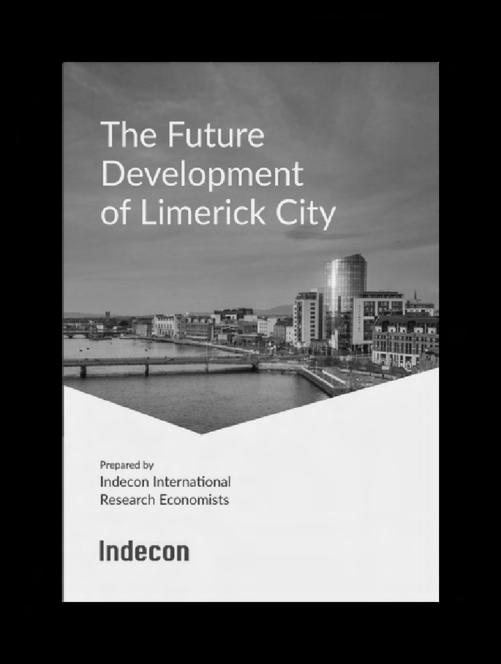
Limerick Chamber Strategic Development Pipeline
Budget 2024 Submission
Future Limerick Report
Page 15
Click the documents to read the full
papers
research
Key Asks:


• Both Limerick and Cork, as Ireland's second and third largest cities, have waited long enough for a safe and adequate motorway connection. It is of critical importance that the N/M20 Limerick to Cork Motorway is continually supported, as well as encouraging decision makers to make efficiencies where possible.

• Limerick Chamber has continually called for safety improvements at the Mackey / Newport Roundabout due to safety concerns. While we welcome the inclusion of this work in LSMATS and we welcome the previous news of site purchase in the area, these improvements must be implemented as a matter of urgency.

• It is of critical importance that all decision makers continue to lobby for the development of the full Limerick to Foynes Road. It is of particular importance to the designation of Shannon Foynes Port as a EU Core Network Port (TEN-T) that the road is completed by 2030.

• We need to ensure that there is adequate water supply and infrastructure across the entire region to ensure that not only homes can continue to be delivered but also key infrastructure that will be required out to the future e.g. desalination plants at Shannon Foynes Port.

• We need to ensure better protection and utilisation of Limerick's built heritage.

• Given the increased discourse around the plan to pump water from the Shannon River to Dublin, elected representatives must remain keenly aware of any issues that this might cause from an ecological and economic perspective. There is also a case to be made, whereby if Dublin can no longer expand due to inadequate water supply, that a case can be made to grow Limerick in its place by utilising more local water sources.


• Limerick Chamber has long been an advocate for the Limerick Northern Distributor Road,. Despite not being included in LSMATS a solution must be found to ensure that those travelling from the North and North East side of the city and suburbs do not have to travel through the city centre. This will allow the city centre to become less congested and more shopper friendly. Furthermore, while the existing M7 does provide some connectivity, the congestion at peak hours causes serious delays.
• There is no shortage of plans for the city centre, especially from within the State apparatus. However, the time slippage on these projects are cause for serious concern. We ask that more regular updating and accountability for these projects be brought forward as part of the next election.



• As part of a review for the Limerick Development Plan, we need to ensure that not only is enough land zoned for home building, but also that enough land is zoned in growth areas such as Patrickswell and Foynes.
• With inflation potentially causing issues with delivery of large capital projects, particularly those within the National Development Plan, elected representatives need to ensure that focus remains on the delivery of MidWest projects.
• All Mid-West stakeholders must continue to lobby for the inclusion of Shannon Airport to be part of the longterm Regional Airports Programme (RAP). This is critical for the airport to make required sustainability and other upgrades. Similarly, as Shannon Airport is a key state strategic asset, public transport options from Limerick and other counties must be improved.
Page 16
Transport & Connectivity
A well functioning transport network is critical for societal and enterprise wellbeing. With drastic increases in population, it is more important than ever to ensure that Limerick's, and indeed the Mid-West's transport needs are well catered for. Limerick Chamber believes that there is a function for all transport modes to play a role in modern day living in Limerick. However, Limerick Chamber firmly believes the long-term future of public transport in Limerick and the wider region is through a light rail or commuter rail network. Not discounting the role that buses will play, but a rail system will deliver the critical mass needed to transport large numbers around the region. Furthermore, rail is not bound by the existing narrow structure of the roads, which will see buses caught in congestion unless there a dedicated bus corridors. However, rail does have its own challenges, such as one track networks.
Future transport planning in the region must adhere to principles of transit oriented development whereby dense residential developments are built on or in proximity to transport hubs and nodes. This will counteract the existing sprawling nature of Limerick but will also make public transport more attractive by minimising journey time. Shannon Airport is a critical asset to the region and unlocks potential for enterprises located in the region already, or those thinking of locating in the region. However, the increasing dominance of Dublin Airport and the decision not to include Shannon Airport in the Regional Airports Programme (RAP) means that Ireland is not ensuring an optimal outcome from State-owned airports. Limerick Chamber also sees active travel options as a key part of future transport success and must be supported especially through options to large residential and employment areas.

Supporting Research
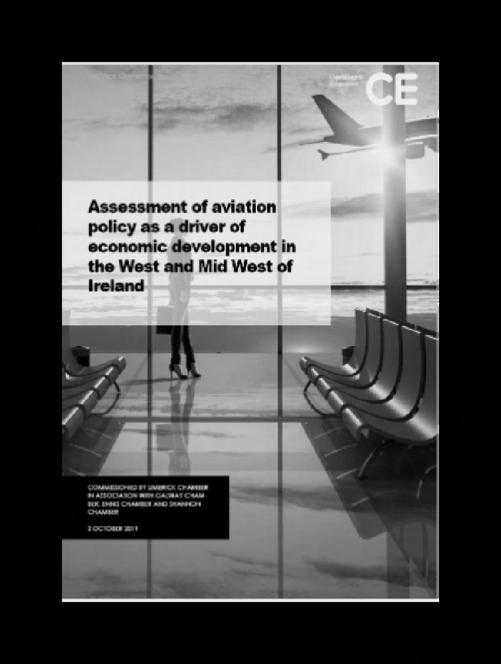

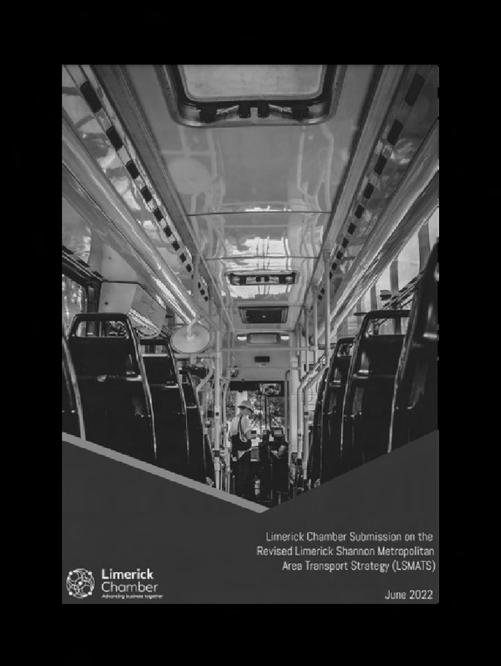

Assessment of aviation policy as a driver of economic development in the West and Mid-West of Ireland
Limerick BusConnects Consultation
Limerick Shannon Metropolitan Area Transport Strategy Consultation
Click the documents to read the full research papers
Page 17
Key Asks:


• It is of critical importance that we continue to advance active and public transport options where appropriate. This is particularly important for large employers. Engagement with our members has outlined that not everybody is in a position to have a car and when other travel options are not available it decreases the potential hiring pool.

• Limerick City Centre is undergoing a great deal of change, from new developments to different transport options. While change is welcome, there must be a plan to cope with the change. For the last several years, Limerick Chamber has advocated for a transport and delivery strategy for the city centre. Work is now underway, however, we must ensure that the plan is comprehensive, workable and delivered on time.

• While Limerick Chamber welcomes the publication of the BusConnects plan for Limerick, there are some omissions that elected representatives must drive to change. Of particular relevance to the Chamber is a bus route to Annacotty Business Park, where 3,000 employees reside and have no access to public or active transport options.

• Data collection and transparent dissemination of data should be at the core of good policy making. However, regular and published data regarding all modes of transport across the Mid-West is poor, and must be rectified by decision makers and elected officials. To gather data is not enough, it must also be available and communicated to citizens.

• Shannon Airport is a key selling point of the region. It is also the reason many businesses locate here. However, we need to advocate for increased support of the airport.
Firstly, Shannon, and indeed Cork, should have long-term access to the regional airports programme. Secondly, there needs to be a connection with a Northern European hub (such as Schipol in Amsterdam) and lastly, there needs to be increased public transport options to the airport from both an inter-city and regional perspective.

• Safe and secure bicycle parking is a must if we wish to increase the use of active travel. While there are some bicycle bunkers in the city centre, we advocate for increasing the amount of these bunkers and opening up access to the general public.

• We ask that decision makers embed the principles of Transport Oriented Development (TOD) into all future plans. This will ensure a greater standard of living for those in the Mid-West.

• Limerick Chamber's longer-term view on public transport in the region is the use of rail. We ask that decision makers and politicans begin to expedite and expand current thinking in terms of a regional rail network with a particular emphasis on Limerick City and Suburbs.
Page 18
Business Viability
The increasing cost of doing business and business viability has been a concern since Brexit. This was then exacerbated by the pandemic, then the war in Ukraine, and then of course the issues caused by an increase in interest rates and shipping challenges in the Red Sea.
The introduction of an increased minimum wage, statutory sick pay and mandatory pension programme are adding further pressure to business viability. To add to this, proposed legislative changes likely to be handed down by the European Union (Late Payments Directive) will see firms being obligated to repay all invoices within 30 days, or they will incur additional fees. While recent changes in the tax debt warehousing scheme are welcome there is a significant viability issue presenting itself among some businesses.
Smaller firms, and those in the retail and hospitality sector, due to smaller margins are unable to deal with the increased cost of doing business in the same way a larger business would.
Almost 44,000 people across the Mid-West work in the retail and hospitality sectors. This equates to almost 18% of the total employment of the Mid-West. Urgent action needs to be taken to ensure that businesses can continue to operate and serve the community.
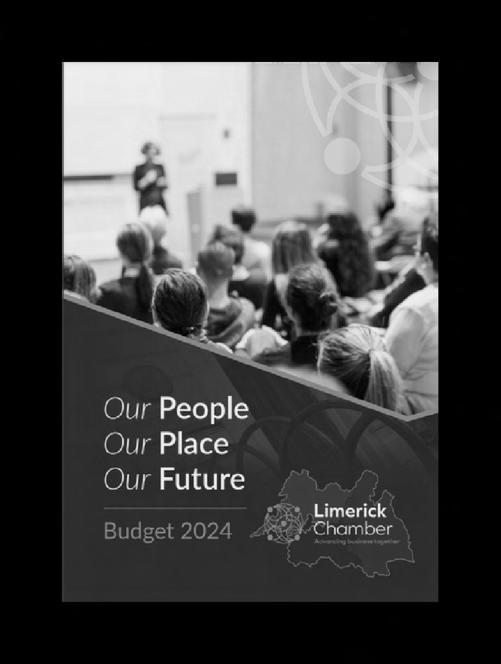




Page 19
Budget 2024 Submission National Energy Security Framework Consultation Mid-West Business Sentiment Survey Click the documents to read the full research papers
Supporting Research
Key Asks:


• Limerick Chamber welcomes the Increased Cost of Doing Business grant announced as part of Budget 2024. However, we ask that feedback is continually assessed in relation to the scheme, taking particular learnings from the Temporary Business Energy Support Scheme (TBESS) issues.

• Smaller businesses are particular exposed to the rising cost of doing business with smaller margin businesses unable to absorb additional costs. A number of changes have already been implemented with more changes to follow along. We ask that decision makers and elected representatives to be conscious of implementing too many changes at once, and to examine the potential of not increasing PRSI or other contributions such as the training levy with the increase in minimum wage.

• Reports of declining footfall and spend is seen as a key risk to customer facing businesses. Limerick Chamber believes that in order to address these issues, we need to make cities, towns and villages more livable. The main aim of which should be to increase affordable and private housing options in these areas so that there is an all day footfall rather than the peak and trough nature we have currently at key times.

• Insurance premiums are continually cited as an overbearing costs of SMEs annual outgoings. We ask that elected representatives continue to highlight and lobby on these issues.

• We ask that elected representatives investigate the potential of a business disruption grant, whereby businesses the are impacted by delivery of capital works passed an agreed timeline are entitled to some relief. For example, the works on O'Connell St. caused severe disruption to business and delivery of the timeline of delivery with the project went well beyond what was portrayed initially and expected,


• We ask for the continued waiving of the outdoor dining licence fees. Not only does this help with the cost of doing business, but it also helps with the ambiance of cities, towns and villages.
• Light, heat, general running costs and insurance premiums continue to challenge business viability. While outside the scope of power for elected representatives locally, we ask that the issue is continually raised at the national level to ensure that businesses can continue to trade and provide much needed goods and services to the local community.


• MEPs must liaise with the Department of Enterprise, Trade and Employment as well as businesses and business organisations to assess the impact of the Late Payments Directive.
• We believe there is scope to examine a reduction in the VAT rates of business providing food and beverage service. This cohort of SMEs, along with other cohorts, are often the life blood of communities. We need very targeted interventions to ensure the cost of doing business is not prohibitive for businesses in continuing business operations, or indeed those organisations looking to start a business.
Page 20
Some critical questions to ask your election candidates
• How do you propose to positively contribute to the housing issues in Limerick?
• How do you propose to increase footfall in city and town centres?
• How will you use your position to lobby for Limerick?
• How will you help to decrease the cost of doing business?
• What are your priorities for your term?
• What is your track record in dealing with the issues outlined in this priority document?
• How do you propose to spend the €8 million mayoral budget?







www.limerickchamber.ie





























































